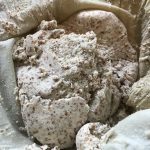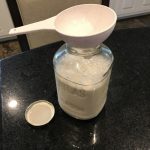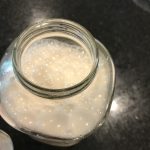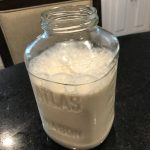If you are one of the approximately 65% of all adult humans who have trouble with lactose, you may have considered switching to non-dairy milk products. If nothing else, simply because you're tired of always paying more for lactose-free [insert dairy product here], or because you keep forgetting to bring your lactase enzymes with you.
What is lactose intolerance?
For those that may be struggling with this issue and learning about this for the first time, allow me to explain. Lactose intolerance is where the body cannot properly break down lactose, milk sugar. This can cause a number of symptoms including diarrhea, cramps, bloating, gas, nausea, and, although not frequent, vomiting.
Lactose, by the way, is why things like milk list 11g of sugar per cup on the label. There's no added sugar in the milk, it's part of the milk. Side note: if you're going to drink or consume milk, I strongly suggest that it be whole milk and organic, preferably pasture-raised. This also applies to or yogurt, or other dairy products.
For those people who cannot tolerate lactose, most of the population, there is a solution. To purchase dairy products where the lactose has been split into it's component parts of galactose and glucose, making it easier to digest. Or taking lactase, an enzyme that their system lacks, which helps to break down the lactose.Other options
For those who would rather not deal with the issues around lactose intolerance there is another option. Plant-based milks. These are made by processing certain things like almonds, coconut, oats, rice, or hemp, and making a milk-like product. While it doesn't taste like milk, it's close enough that it's often an acceptable substitute.
Drinking plant-based milks can, however, come with it's own challenges. One is that because the plant-based options are thinner than milk, emulsifiers and thickeners are added. These are made from plant gums which can cause digestive upset if over consumed or for those with very sensitive digestive tracts.
Carrageenan in particular is strongly linked to digestive health issues and should be avoided in any product. Other plant gums can be just as overwhelming to the system, causing many of the problems that lactose does.
Making almond milk at home
Instead of buying plant milks at the store it is possible to make them at home. Almond and coconut are the easiest to make yourself. With just a little bit of time, a few healthy ingredients, and not a lot of equipment, you can enjoy your own delicious homemade milk.
Almond Milk
- 2 cups almonds
- 4 cups filtered water
- 1 teaspoon sea salt
- 1 teaspoon vanilla extract (optional)
- Soak almonds in water overnight
- Discard soaking water and rinse almonds well
- Place almonds, salt, vanilla, and 4 cups of water in a high powered blender
- Blend on high speed for 2 minutes
- Strain through cheesecloth or a nut milk bag
- Solids can be refrigerated and used in baking within 4-5 days
- Refrigerate almond milk before serving
No Soy
You may be wondering why soy milk is not on my suggested list of plant-based milks. I don't recommend consuming it because soy tends to be one of the most highly genetically modified crops we have. Soy is also a phytoestrogen, meaning plant estrogen, and can disrupt hormones. Therefore it's best to avoid not only soy milk, but also the wide variety of soy-based products on the market.
Sources
Nardi, J. et al. Prepubertal subchronic exposure to soy milk and glyphosate leads to endocrine disruption. Food and Chemical Toxicology
Volume 100, February 2017, Pages 247-252. https://www.sciencedirect.com/science/article/pii/S0278691516304896





